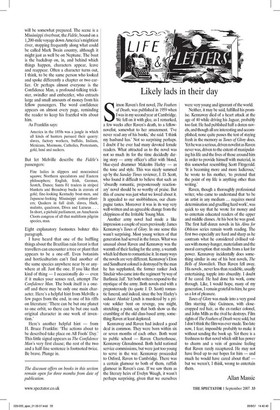Likely lads in their day
Simon Raven's first novel, The Feathers of Death, was published in 1959 when I was in my second year at Cambridge. We fell on it with glee, as I remarked, a few weeks after Raven's death, to a fellownovelist, somewhat to her amazement. 'I've never read any of his books,' she said. 'I think my husband has.' Not so surprising perhaps. I doubt if he ever had many devoted female readers. What attracted us to the novel was not so much its for the time decidedly daring story — army officer's affair with blond, blue-eyed drummer Malcolm Harley — as the tone and style. This was nicely summed up by the Sunday Times reviewer, J. D. Scott, who found it difficult to believe that such an 'absurdly romantic, preposterously reactionary' novel should be so worthy of praise. But this of course was just what we loved about it. It appealed to our snobbishness, our champagne tastes. Moreover it was in its way very well-written and an agreeable change from the chippiness of the Irritable Young Men.
Another army novel had made a like impression a couple of years previously: James Kennaway's Tunes of Glory. In one sense this wasn't surprising. Most young writers of that generation had served in the forces. What was unusual about Raven and Kennaway was the warmth of their feeling for the army, a warmth which led them to romanticise it. In many ways the novels are very different. Kennaway's Eton and Sandhurst colonel is destroyed by the man he has supplanted, the former ranker Jock Sinclair who came into the regiment 'by way of Barlinnie Jail'. Yet both writers respond to the mystique of the army. Both novels end with a preposterously (to quote J. D. Scott) romantic funeral, and indeed, since the boy Harley's seducer Alastair Lynch is murdered by a private soldier bent on revenge, you might, stretching a point, say that both show us the crumbling of the old class-based army, something Raven at least deplored.
Kennaway and Raven had indeed a good deal in common. They were born within six or seven months of each other. Both went to public school — Raven Charterhouse, Kennaway Glenalmond. Both held national service commissions, but were just too young to serve in the war. Kennaway proceeded to Oxford, Raven to Cambridge. There was a certain glamour to both of them, raffish glamour in Raven's case. If we saw them as the literary heirs of Evelyn Waugh, it wasn't perhaps surprising, given that we ourselves were very young and ignorant of the world.
Neither, it may be said, fulfilled his promise. Kennaway died of a heart attack at the age of 40 while driving his Jaguar, probably too fast. He had published half a dozen novels, and though all are interesting and accomplished, none quite passes the test of staying fresh in the memory as Tunes of Glory does. Yet he was a serious, driven novelist as Raven never was, driven to the extent of manipulating his life and the lives of those around him in order to provide himself with material, in this somewhat resembling Scott Fitzgerald. 'It is becoming more and more ludicrous,' he wrote to his mother, 'to pretend that the point of my life is anything other than writing.'
Raven, though a thoroughly professional writer, who came to understand that 'to be an artist in any medium ... requires moral determination and gruelling hard work', was quick to say that he wrote for money and to entertain educated readers of the upper and middle classes. At his best he was good. The first half-dozen novels in his Alms for Oblivion series remain worth reading. The first two especially are hard and sharp as he contrasts what he considered civilised values with money-hunger, materialism and the moral corruption that results from a lust for power. Kennaway incidentally does something similar in one of his best novels, The Bells of Shoreditch. Then Raven fell away. His novels , never less than readable, usually entertaining, topple into absurdity. I doubt if he cared. He had done his work, come through. Like, I would hope, many of my generation, I remain grateful to him; he gave us a lot of pleasure.
Tunes of Glory was made into a very good film starring Alec Guinness, with closecropped red hair, as the ex-ranker colonel, and John Mills as the rival he destroys. Film rights of The Feathers of Death were sold, but I don't think the film was ever made. Too late now, I fear; impossible probably to make it without sending the book up. Yet there is a freshness to that novel which still has power to charm and a vein of genuine feeling that Raven rarely recaptured. He may not have lived up to our hopes for him — and much he would have cared about that! — but we weren't, I think, wrong to entertain them.
Allan Massie







































 Previous page
Previous page